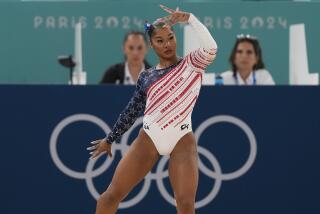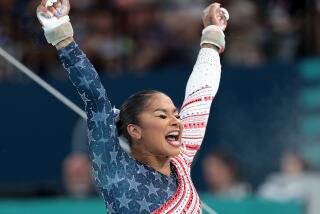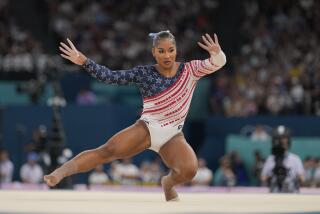Skating’s Bridge Creates a Divide
- Share via
More to express indignation than with an expectation of immediate change, the U.S. Figure Skating Assn.’s executive committee passed a resolution Wednesday opposing the sport’s interim judging system and requesting clarification of when the computer-reliant system endorsed by International Skating Union President Ottavio Cinquanta will take effect.
The interim system in use this season is a bridge between the old system, in which judges’ scores were publicly attributed to them, and a proposed new system in which points will be based on predetermined values for each element and totaled to present a cumulative score. Under the interim system, scores are randomly selected to count for each skater’s placement and marks are displayed by range, not by judge. That system will be used at the world championships later this month in Washington.
The changes were made to minimize block voting and avoid repeats of the judging scandal that consumed the Salt Lake City Olympics. Marie-Reine Le Gougne of France said she had been pressured to vote for a Russian couple in the Olympic pairs event and although she later recanted, double gold medals were awarded to the second-place Canadian pair.
Judging reforms were approved during the ISU’s Congress last June in Japan. However, the USFSA said it opposes the interim system and urged that marks be displayed publicly. It also wants assurance the proposed computer-based system won’t be adopted until the ISU Congress meets in 2004, even though it already appears as a rule in the ISU’s Constitution and General Regulations.
“I believe it was voted in as a project, but in order to be used in championship events, it does have to be in the rules and be voted upon,” USFSA President Phyllis Howard said. “It was approved to be tested and I support it being tested at the senior Grand Prix series next year. But we haven’t seen enough of it.”
Morry Stillwell, a former USFSA president and member of the ISU management and Grand Prix committees, said reading a range of marks rather than going judge-by-judge accelerated the pace of the event. “But in one sense, I’d like to be able to know about the judges,” he said. “It’s true there’s not accountability to the person watching on TV or sitting in the audience.... However, there is a companion system that records the range of marks and placement, so if [a judge] screws up, the computer program catches it and there will be action taken by the technical committee.”
Olympic bronze medalist and world silver medalist Tim Goebel, who trains in El Segundo, said the interim system’s lack of accountability is its weakness. “But the good part is having any collusive behavior would be very difficult,” he said. “If you don’t know if your marks are going to count, why give up your mark for the skater from another judge’s country?
“But it’s not right that there’s no accountability. I don’t think that’s right in any aspect of life. When you do something wrong, you should be held accountable.... If judges feel their marks are fair and reflective of the skating, what are they afraid of?”
More to Read
Go beyond the scoreboard
Get the latest on L.A.'s teams in the daily Sports Report newsletter.
You may occasionally receive promotional content from the Los Angeles Times.







